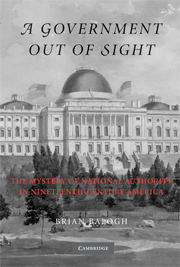Book contents
- Frontmatter
- Contents
- Acknowledgments
- 1 Introduction: Why Look Back?
- 2 How Americans Lost Sight of the State: Adapting Republican Virtue to Liberal Self-Interest
- 3 Between Revolutions: The Promise of the Developmental Vision
- 4 “To Strengthen and Perpetuate that Union”: Republican Political Economy
- 5 Outside the Boundaries: “Powers and Energies in the Extreme Parts”
- 6 The Uncontested State: Letters, Law, Localities
- 7 Restoring “Spontaneous Action and Self-Regulation”: Civil War and Civil Society
- 8 Judicial Exceptions to Gilded Age Laissez-Faire
- 9 “A Special Form of Associative Action”: New Liberalism and the National Integration of Public and Private
- 10 Conclusion: Sighting the Twentieth-Century State
- Index
3 - Between Revolutions: The Promise of the Developmental Vision
Published online by Cambridge University Press: 05 August 2012
- Frontmatter
- Contents
- Acknowledgments
- 1 Introduction: Why Look Back?
- 2 How Americans Lost Sight of the State: Adapting Republican Virtue to Liberal Self-Interest
- 3 Between Revolutions: The Promise of the Developmental Vision
- 4 “To Strengthen and Perpetuate that Union”: Republican Political Economy
- 5 Outside the Boundaries: “Powers and Energies in the Extreme Parts”
- 6 The Uncontested State: Letters, Law, Localities
- 7 Restoring “Spontaneous Action and Self-Regulation”: Civil War and Civil Society
- 8 Judicial Exceptions to Gilded Age Laissez-Faire
- 9 “A Special Form of Associative Action”: New Liberalism and the National Integration of Public and Private
- 10 Conclusion: Sighting the Twentieth-Century State
- Index
Summary
Although the ideal of autonomous individuals pursuing happiness through an expanding market while governing themselves locally displaced a polity-centered conception of citizenship, this objective was more easily conceived than realized in British North America. This chapter returns to the late eighteenth century to examine the ways in which Americans adapted ideas and practices to the political and economic challenges they faced in their daily lives. At times these obstacles were imposed by the British. On other occasions, it was the colonists who struggled to resolve political differences among themselves as they grappled with a wide range of demographic and economic differences. Whether uniting across class lines to demand rights from an imperial foe, or airing internal differences at the national level, the crucible of political struggle and the institutions and policies that these battles produced reinforced the premise behind a geographically extensive union. Even the political factions that eventually hardened into much-denounced political parties contributed to the process as they nationalized the debate in ways that underscored the extensive reach of issues like trade, national security, and expansion.
Americans fought and won two revolutions between 1776 and 1790. The first, waged against the British Empire, was conducted in the name of liberty. How was liberty for individuals and local communities to be preserved in a world of power politics and mercantilist trade policy? Perhaps this balance was possible when Great Britain provided military and commercial protection to British North Americans without demanding much in return. But as Great Britain sought to consolidate its empire after the Treaty of Paris (1763), imposing new taxes and enforcing duties, British North Americans began to pay a high financial and political price for their provincial status.
- Type
- Chapter
- Information
- A Government Out of SightThe Mystery of National Authority in Nineteenth-Century America, pp. 53 - 111Publisher: Cambridge University PressPrint publication year: 2009



